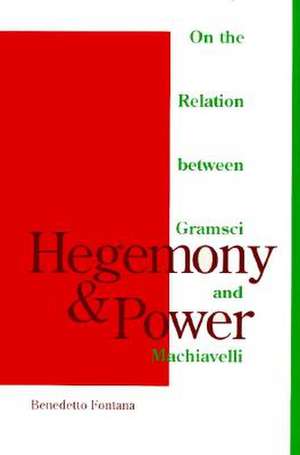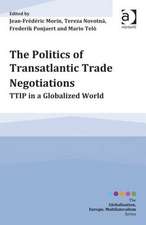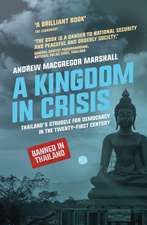Hegemony And Power: On the Relation between Gramsci and Machiavelli
Autor Benedetto Fontanaen Limba Engleză Paperback – 21 sep 1993
Presents a comparative and textual exploration of Gramsci's interpretation of Machiavelli's political analyses. This valuable contribution to our understanding of Gramsci includes a comparison of the major Machiavellian ideas such as the nature of political knowledge, the new principality, the concept of the people, and the relation between thought and action, to Gramsci's concepts of hegemony, moral and intellectual reform, and the collective will.
| Toate formatele și edițiile | Preț | Express |
|---|---|---|
| Paperback (1) | 428.33 lei 6-8 săpt. | |
| Rowman & Littlefield – 18 aug 2006 | 428.33 lei 6-8 săpt. | |
| Hardback (1) | 678.28 lei 6-8 săpt. | |
| Rowman & Littlefield – 24 iul 2006 | 678.28 lei 6-8 săpt. |
Preț: 140.42 lei
Preț vechi: 170.32 lei
-18% Nou
Puncte Express: 211
Preț estimativ în valută:
26.87€ • 28.12$ • 22.36£
26.87€ • 28.12$ • 22.36£
Comandă specială
Livrare economică 14-26 martie
Doresc să fiu notificat când acest titlu va fi disponibil:
Se trimite...
Preluare comenzi: 021 569.72.76
Specificații
ISBN-13: 9780816622887
ISBN-10: 0816622884
Pagini: 242
Dimensiuni: 152 x 229 x 18 mm
Greutate: 0.34 kg
Ediția:First edition
Editura: University of Minnesota Press
Colecția Univ Of Minnesota Press
Locul publicării:United States
ISBN-10: 0816622884
Pagini: 242
Dimensiuni: 152 x 229 x 18 mm
Greutate: 0.34 kg
Ediția:First edition
Editura: University of Minnesota Press
Colecția Univ Of Minnesota Press
Locul publicării:United States
Notă biografică
Benedetto Fontana teaches political science at Baruch College, The City University of New York.
Recenzii
"Immensely valuable. Let it suffice here to say that from now on, all Gramsci scholars will have to take Fontana’s contribution into account in ways that are not merely incidental to this or that aspect of Gramsci’s political thought and conception of Marxism, but that are absolutely indispensable to an integrated understanding of his world view."—Rivista Di Studi Italiani
"By contrasting Gramsci's interpretation of Machiavelli with Croce's, Fontana presents a spare but surprisingly trenchant critique of liberalism. By locating Gramsci, like Machiavelli, within the tradition of civic republicanism, Fontana offers fresh and profound insights into Gramsci's thought and his significant, gap-filling role in the Marxian tradition."—Choice
"Fontana’s angle of entry is a crucial one, for while Gramsci has indeed survived with honor even in self-designated ‘post-Marxist’ thinking, the sticking point remains Gramsci’s modernist insistence on the revolutionary necessity of an organized, mass-based political party. The insight and the awareness of both historical circumstances and philosophical positioning that Fontana brings to bear on Gramsci’s reading of Machiavelli seems to me an indispensable corrective to an all-to-familiar ‘post’ assumption that a party politics engaged in fundamental, global conflicts is merely a thing of the past."—American Political Science Review
"Engaging and thoroughly readable. Through the lens of Gramsci’s writings, Fontana opens an unexpected and exciting space for dialogue between Florentine republicanism and Marxist humanism. This study will interest and provide a useful text for students concerned with the nature of modern politics in general. A valuable resource for anyone concerned with the problem of ideology, political knowledge and mass movements."—Millennium
"This excellent work is the first book-length study on the relation between Gramsci and Machiavelli to be published in English."—Science and Society
"As a study of reconstruction, as an antidote to the near-hegemony of postmodern discourse, Fontana’s study serves well. In an odd but nonetheless productive blending of elements from the work of Gramsci and Arendt, Fontana ably counters talk of the ‘end of politics’, and he cogently defends ‘the vitality and centrality of politics’."—Southern Humanities Review
"By contrasting Gramsci's interpretation of Machiavelli with Croce's, Fontana presents a spare but surprisingly trenchant critique of liberalism. By locating Gramsci, like Machiavelli, within the tradition of civic republicanism, Fontana offers fresh and profound insights into Gramsci's thought and his significant, gap-filling role in the Marxian tradition."—Choice
"Fontana’s angle of entry is a crucial one, for while Gramsci has indeed survived with honor even in self-designated ‘post-Marxist’ thinking, the sticking point remains Gramsci’s modernist insistence on the revolutionary necessity of an organized, mass-based political party. The insight and the awareness of both historical circumstances and philosophical positioning that Fontana brings to bear on Gramsci’s reading of Machiavelli seems to me an indispensable corrective to an all-to-familiar ‘post’ assumption that a party politics engaged in fundamental, global conflicts is merely a thing of the past."—American Political Science Review
"Engaging and thoroughly readable. Through the lens of Gramsci’s writings, Fontana opens an unexpected and exciting space for dialogue between Florentine republicanism and Marxist humanism. This study will interest and provide a useful text for students concerned with the nature of modern politics in general. A valuable resource for anyone concerned with the problem of ideology, political knowledge and mass movements."—Millennium
"This excellent work is the first book-length study on the relation between Gramsci and Machiavelli to be published in English."—Science and Society
"As a study of reconstruction, as an antidote to the near-hegemony of postmodern discourse, Fontana’s study serves well. In an odd but nonetheless productive blending of elements from the work of Gramsci and Arendt, Fontana ably counters talk of the ‘end of politics’, and he cogently defends ‘the vitality and centrality of politics’."—Southern Humanities Review
Descriere
Descriere de la o altă ediție sau format:
This book provides the first systematic examination of the relationship of hegemony and power. Nine essays delve into the diverse analytical aspects of the two concepts, and an introduction and conclusion by the editors, respectively, forge a synthesis of their theoretical coherence.
This book provides the first systematic examination of the relationship of hegemony and power. Nine essays delve into the diverse analytical aspects of the two concepts, and an introduction and conclusion by the editors, respectively, forge a synthesis of their theoretical coherence.











